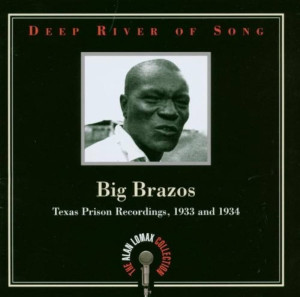 Big Earl Sellar wrote this review.
Big Earl Sellar wrote this review.
Another set of field recordings made by the Lomaxes, Big Brazos focuses on the songs of the black work gangs in the early 1930s. It’s an interesting disc, another one of those brief moments in time that the Lomaxes managed to preserve so well.
Made entirely of group or call-and-response singing, this disc covers a surprising breadth of the pre-1950s African-American musical spectrum. “Old Rattler” gives us a look at the blues of Leadbelly and Muddy Waters, in the form of a folk song. “I Wonder What’s The Matter,” led by Lightnin’ Washington (one of the stars of this disc) foreshadows slow testifying gospel, and ultimately the Africanization of jazz by Davis & Malaska some 30 years later. While most of this disc was either taken from the black culture mainstream (“Black Betty,” “Long John”) or entered it (“Hammer Ring,” “Great God A’Mighty (Long Hot Summer Days)”), there’s still a fascinating angle to how these songs are performed.
In the tradition of itinerant singers everywhere, these prisoners would have a fairly large repertoire of songs, either knowing or making up dozens of verses, being adept at improvising, or knowing only the chorus/response to continue the song along for hours. Two very different versions of “Old Rattler” included show this off rather nicely. The first, lead by Moses “Clear Rock” Platt, describes a large prison dog chasing an escaped prisoner; the second, called by Augustus “Track Horse” Haggerty, is an ode to a former pet. The result is two entirely different songs, sung to the same form and with the same response melody by the backing groups. Given the obvious lack of outside musical influence, it’s a simple and effective way to fill out a repertoire using only a few songs.
Although some of the calling is wonderful (James “Iron Head” Baker is especially good, rather like Big Bill Broonzy ), most of the vocals are rather pedestrian. Accompaniment is limited to hand claps or tools (picks, axes) working in unison. Those tracks are also fascinating, showing how the songs helped to set some wonderful rhythms to work by. Work song is not a misnomer in this case.
The recording qualities are iffy. But given that these are obviously acetate recordings from the 1930s, Rounder’s done an acceptable job in cleaning up the sound. Some extraneous surface noise is evident in places, even though the recordings themselves have obviously been remastered. However, the hiss isn’t too bad, and not distracting.
The booklet boasts the usual copious notes, lyrics and sources, as well as several photographs of some of the performers. Unfortunately, no follow-up material is included on any of the artists. Again, this isn’t a party record. Nor is it something that will get constant play on my system. But this is more than just a historical recording. There’s real music on this disc, sincere stuff. As long as Rounder can keep up with these wonderful reissues from the Alan Lomax collection, we’ll be assured of a continuing history of wonderful, forgotten music from the recent past. If Big Brazos sounds interesting to you, jump on it: it’s a great disc.
(Rounder, 2000)
